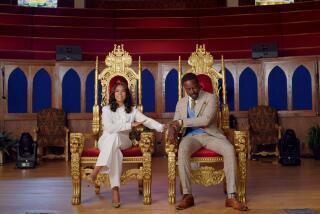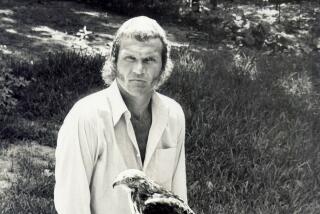Homily Grits : GOSPEL HOUR, <i> By T. R. Pearson (William Morrow: $19.95; 384 pp.)</i>
- Share via
In this, his fifth novel, T. R. Pearson, who has been favorably compared with Mark Twain, puts under his microscope for a short time a cast of Virginia hillbillies whose revelations turn upon the apparently fatal logging accident of one Donnie Huff.
Huff, it seems, was crushed and drowned when a tree he was removing got loose and sent him tumbling into a mountain stream and for all intents drowned him, except that after a companion rushes off to bring the bad news to Huff’s family, Huff miraculously revives himself.
This event sets into motion a plan by Huff’s ambitious mother-in-law, Opal Criner, that Huff should become a revivalist preacher so as to get money for retelling his story about returning from the dead.
Huff’s wife, on the other hand, thinks the whole affair is ridiculous and spends much of the book demeaning her sainted husband, who seems, mostly, just to want to return to where he was before the accident.
In the process of examining all the ramifications of Huff’s experience, the author treats us to a plethora of folksy people and places: people with names such as Billy Snavely and Mrs. Dot Bunch and Miss Cindy Womble, who live in such places as Galax and Mt. Airy and Snake Creek, and who drive, in addition to pickup trucks, Skylarks, Coronets, Biscaynes and Venturas. Moreover, they keep statues of Robert E. Lee on the toilet tank, make tables out of carvings of Imogene Coca and decoupage magazine photos of Lincoln town cars on boxes. They eat Cheez-Its and Lorna Doones and put ketchup on their scrambled eggs. And when they are not Boraxing the rug, or worrying over earwax remover or corn plasters, they do their worshiping at institutions such as the Laurel Fork Full Gospel Primitive Missionary Holiness Church.
Certainly such people exist, and not just on “Andy of Mayberry.” Why Pearson chooses to tell us about them is another matter.
Certainly he evokes a kind of whimsical sympathy in his characters. Each, caught up in his or her own little world, exhibits a sort of touching innocence, especially when contrasted with the vast outside, which is brought into their homes each night by the television. Seen this way, the people in “Gospel Hour” seem almost frozen in time, throwbacks to a simpler, primitive culture whose attempts to cope with the modern world are hopelessly behind the times.
Pearson painstakingly explores all these people, their backgrounds, their wants and desires and their foibles, but it is a slow, slow grind. Like Garrison Keillor, with whom Pearson also has been favorably compared, the brand of humor in this book is a combination of the wry, the ironic and the understated. But whereas Keillor’s stories are generally short takes, designed to be read over the air in 10-minute bites, an entire book of this sort of thing gets a little overstuffed. I mean, how many people ever would sit still to hear Garrison Keillor read a story 200,000 words long?
Understatement as a form of comedy is a time-tested device, but in Pearson’s hands, it often becomes tiresome. For instance this description of a man beaten by police:
“Of course that man in the coveralls, who’d received a blow just previously on the identical collarbone in near about the identical spot, turned around to express and perhaps even act upon his displeasure which the Beckley policeman, being a professional law officer, had anticipated he likely would and so had danced deftly aside, thereby situating himself to apply chiefly to that fellow’s windpipe a special professional law officer choke hold which the policeman demonstrated for the correspondent once she’d volunteered her trachea that he promised not to dent and crush.”
Unfortunately, there are all too many paragraphs such as the above in “Gospel Hour,” and they render the book unwieldy. So also do the frequent 100-plus-word Faulknerian (another author with whom Pearson has been favorably compared) “stream-of-consciousness” sentences, which do little to further such action as exists in the story.
Clearly Pearson is a writer of talent and originality, but “Gospel Hour” is not a vehicle that showcases these particular attributes.
More to Read
Sign up for our Book Club newsletter
Get the latest news, events and more from the Los Angeles Times Book Club, and help us get L.A. reading and talking.
You may occasionally receive promotional content from the Los Angeles Times.








